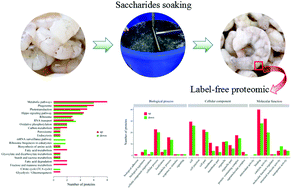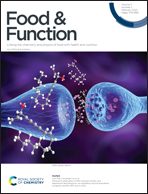Trehalose and alginate oligosaccharides increase the stability of muscle proteins in frozen shrimp (Litopenaeus vannamei)†
Abstract
Muscle proteins in whiteleg shrimp (Litopenaeus vannamei) are susceptible to denaturation and are affected by freezing and frozen storage. Cryoprotective trehalose (TR) and alginate oligosaccharides (AOs) can slow the degradation of myofibrillar proteins and reduce mechanical damage to shrimp muscle tissues. We conducted label-free based proteomic analysis to study the stability of proteins in TR- and AO-treated shrimp after 30 d of frozen storage at −18 °C. A total of 2155 peptides and 626 proteins were identified and quantified in shrimp muscle. The most common 95 differentially abundant proteins (DAPs) were down-regulated and detected in distilled water (DW), TR, and AO, especially the down-regulated DAPs including actin, calcium-transporting ATPase, myosin heavy and light chains, paramyosin, tropomyosin, and troponin. Most of the above DAPs were up-regulated in TR/AO compared to DW. This was most likely due to the incorporation of TR/AO molecules into the muscle tissues, resulting in decreased protein degradation and reduced damage from ice crystal growth. Gene Ontology (GO) analysis indicated that these DAPs were mainly involved in binding, catalytic activity, cell, cell parts, cellular process, and metabolic process items, which were associated with the protein structure, function, and metabolism. Kyoto Encyclopedia of Genes and Genomes (KEGG) results suggested alteration of many pathways, including metabolic pathways, carbon metabolism, phototransduction, phagosome and ribosome pathways, which are involved with arginine kinase, L-lactate dehydrogenase, malate dehydrogenase, phosphoglycerate mutase, and ribosomal proteins. The TR/AO treatment maintained the natural conformation, structure, and function of the DAPs and delayed the degradation of muscle proteins. Here, this study provided a deeper insight into the protein changes in shrimp muscle during frozen storage and could be a valuable foundation for future investigations.

- This article is part of the themed collection: Food & Function Recent HOT articles


 Please wait while we load your content...
Please wait while we load your content...